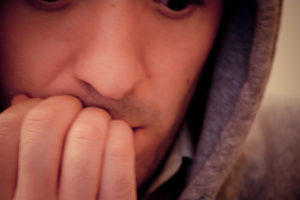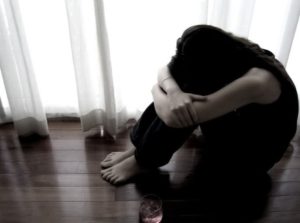SHARES

“I would sleep the whole day in my apartment. I wake up wondering why the day is still not over. It happens every single day to the point it becomes extremely unhealthy. Not only do I just sleep but I wasn’t eating well and socialising. I was anxious and I didn’t go out to do things. I didn’t have anyone to do things with. Maybe part of it is I didn’t want anyone. You know, I am terrified and I don’t trust people. I have no choice. My past is broken, my family is broken and I am broken.” Lalina is depressed and alone but, at the same time, feeling fearful when being with people.
Depression and anxiety can affect every one of us differently. Sometimes, depression can lead to anxiety. Sometimes, the opposite is true. Most people experience them separately while a few experience both of them at the same time.
What are anxiety and depression?
Anxiety and depression throughout history
The history of anxiety and depression can be traced back to 4000 years ago. In olden days, both anxiety and depression were believed to be triggered by “fixed” ideas. In the philosophical writing of Seneca, thinking badly about the future can lead to anxiety while thinking negatively about the past can lead to depression. Both used to be considered as symptoms for melancholia and were not distinguished separately. In fact, the patients suffering from anxiety and depression described a feeling of darkness and hopelessness, giving rise to the term “melankholia” which means blackness and darkness in Latin. Likewise, Burton, in his writing of “The Anatomy of Melancholy”, described that sorrow and fear are continual companion, and one leads to another. Later in the history (after 19th century), anxiety and depression were increasing recog nized and identified as illness that can be treated.
Anxiety and depression in modern days
In modern psychiatry, anxiety is defined as anticipation of future threats. This can be normal and helpful for adaptation as long as the distressing experience is manageable. On the other hand, depression is a mood disorder, in which we feel sad and sorrow for a long time and are unable to enjoy the pleasure in life. These feelings are normal when we are in face of stressful live events such as loss of something or someone dear to us, changing work or living environment and even losing ourselves. Getting help from family, friends, community and your doctor can help you through these down and sad period in your life.
How Do I Know If I Have Anxiety or Depression?
Anxiety
1. You Worry Excessively
You may have bad experience before that makes you worry about the possibility of it happening again. However, all thoughts and worries are unreal until our action and intention make them into reality. These memories and emotions are important to keep us away from potential threats but sometimes they are not helpful because the situation changed or we ourselves grow to become more capable in overcoming troubles. If these worries are too much to handle and disturb your daily life, your doctor is ready to help you out! Make sure you get help from a doctor if you have been worrying too much for the past 6 months because this is really bad for your body and mind.
2. You have Bodily Symptoms related to stress and anxiety
Anxiety affects everyone differently. Sometimes, it leaves you weakened, easily fatigued and sometimes exhaustion. You find yourself unable to relax and tensed up with bodily aches and sore muscles. Some people quieten with storming thoughts and inner turmoil while others act out with shaky body, restless hands and legs. In a more acute form of anxiety called panic disorder, you experience “pressing” (premens) symptoms such as tension headache, airway narrowing, heavy breath, pressure on chest and racing heartbeat, churning and cramping tummy, vaginismus (constricting vagina making sex painful), and urges to urinate (due to contracting urinary bladder). Most important of all, your sleep becomes affected. You may be having difficulty falling asleep because your body is alert and getting you ready to fight or run away from threats. You may even find yourself waking up at specific time of the night feeling fearful and even sad.
3. Your Act Out on your worries
Open to receiving is like everything. If you’re not ready to accept your worries as real, reasonable and, more importantly, part of you, you’re more likely to beat yourself up and deny or repress yourself. Your bottled up frustration and fear will overwhelm you every now and then, making you act out on your worries. In obsessive-compulsive disorder, a form of anxiety, you may perform an action that is almost a ritual to ease your worrying thoughts. For example, if you consistently think that you’ll get sick from dirty hands, you keep washing your hands to the extent that it becomes illogical and serves only the purpose to make you feel better for a while. Often, you get anger outburst and feel disgusted or irritated by people and things around you. You know this when you overreact to others mistakes or blaming and hurting others for no reason (eg. kicking your cat). A better way to release your tension and anxiety is through exercises, writing, painting, meditation etc. without harming others. Besides, you may not realize that your body act out on your worries too, like shaking your legs, restlessness, pacing up and down, touching your face and body, scratching your head, blinking your eyes and wiping your sweats etc. These are warning signs that your anxiety is building up and you need to take care of it.
Depression
1. You feel sad for a long time and is unable to enjoy life pleasure
It is normal for us to feel sad, guilt, uninterested and to grieve. However, if these emotions are not improving after 2 weeks, it is time to help yourself up and see you doctor. These emotions can affect our life so much and put us in a downward spiral of feeling worse and worse.
2. You are doing everything less
You have low energy almost every day with little interest or motivation to do things. Hence, you find yourself lying down a lot and hardly leave the house. You move less, talk less and think less and decide less. These may not be noticeable to ourselves but our surrounding people will notice that.
3. Rapid changes in your body weight
Feeling sad can leave you with no appetite at all. Sometimes, it is the other way round in which you have binge eating. You’ll notice your body weight changes rapidly in weeks.
4. Poor concentration and memory
You will find yourself getting forgetful and struggle to concentrate at your work. These are also accompanied by difficulty in thinking through things and making decision.
5. You feel worthless and guilty
You think negatively and feel bad about yourself. Often, you’re punishing and being unkind to yourself. When it is worst, you feel like harming yourself. Your family, friends and doctor are out there for you whenever you struggle to find a sense of belonging in this world.
Conclusion
Anxiety and depression are normal range of emotion that every one of us feel in life. Learning to identify our feelings is the first step in understanding our needs so that we can accept who we are and free ourselves from unreal thoughts. Be gentle and kind to ourselves. Give ourselves enough time and room for growth. Remember, open to receiving is like everything. This includes accepting ourselves, others and the world around us.
Find a GP/Family Doctor, Psychologist and Psychiatrist in Malaysia, on GetDoc
Find a GP/Family Doctor, Psychologist and Psychiatrist in Singapore, on GetDoc
References:
- Marc-Antoine C. A history of anxiety: from Hippocrates to DSM. Dialogues Clin Neurosci. 2015 Sept;17(3):319-325.
- Nita V. Anxiety disorder clinical presentation [Medscape]. WebMD LLC. 2019. [Available from: https://emedicine.medscape.com/article/286227-clinical; last updated on 2019 Mar 27; accessed on 2019 June 25]
- Jerry V. Depression clinical presentation [Medscape]. WebMD LLC. 2019. [Available from: https://emedicine.medscape.com/article/286759-clinical; last updated on 2019 Mar 28; accessed on 2019 June 25]
by Chang Xian
View all articles by Chang Xian.








